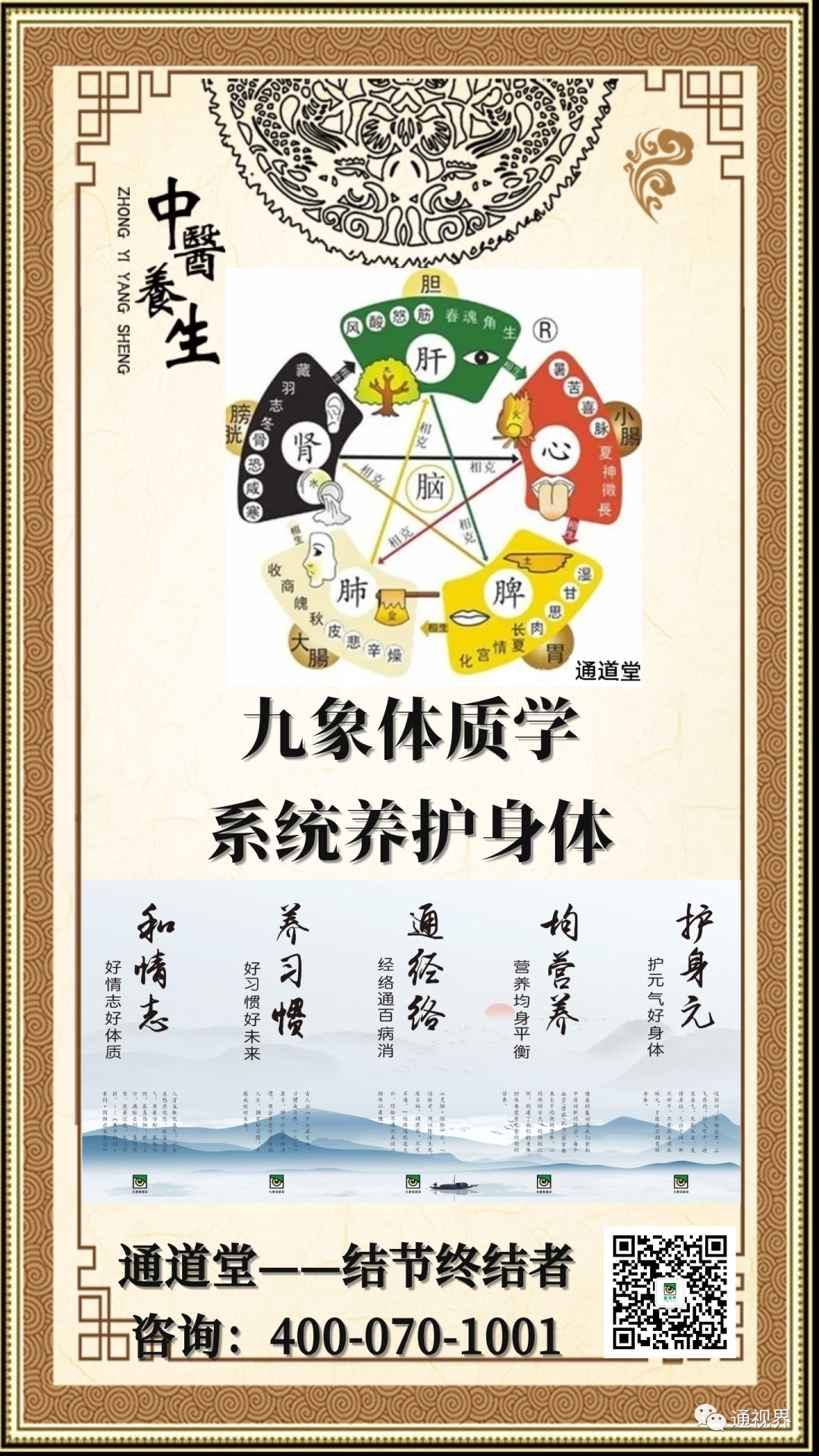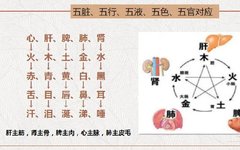The five organs and six bowels refer to the totality of the human body’s organs. The five organs are the liver (Gan), heart (Xin), spleen (Pi), lungs (Fei), and kidneys (Shen), while the corresponding six bowels are the gallbladder (Dan), small intestine (Xiao Chang), large intestine (Da Chang), stomach (Wei), bladder (Pang Guang), and the San Jiao (Triple Burner). The human body is centered around the five organs, with the six bowels working in conjunction, relying on the material foundation of qi (气), blood (血), essence (精), and fluids (津液). Through the meridians (经络), the organs are closely connected to each other, as well as to the five senses and limbs, forming a unified organic whole, which is the concept of the five organs as one.
The five organs are the center of life in the human body, connected to various tissues, organs, and life phenomena. For example, the six bowels (gallbladder, small intestine, large intestine, stomach, bladder, and San Jiao) are the exterior manifestations of the five organs; the pulse (脉), skin (皮), flesh (肉), tendons (筋), and bones (骨) are governed by the five organs; the face (面), hair (毛), lips (唇), nails (爪), and skin (发) are nourished by the five organs; the tongue (舌), nose (鼻), mouth (口), eyes (目), ears (耳), and the two yin (阴) are the sensory orifices governed by the five organs; the five emotions (喜,忧,思,怒,恐) are generated by the five organs; the five spirits (神,魄,意,魂,志) are stored by the five organs; and the five fluids (汗,涕,泪,涎,唾) are transformed by the five organs. They are also associated with the five elements and operate according to the principles of generation, overcoming, and mutual containment of the five elements.
The generation and overcoming of the five organs is a complex three-dimensional network structure. Each organ possesses partial functions of the five organs and is a microcosm and unity of the five organs, which is the meaning of “mutual containment of the five organs.” Therefore, the Jing Yue Quan Shu states: “The qi of the five organs must irrigate each other, thus each of the five organs must contain the five qi.”
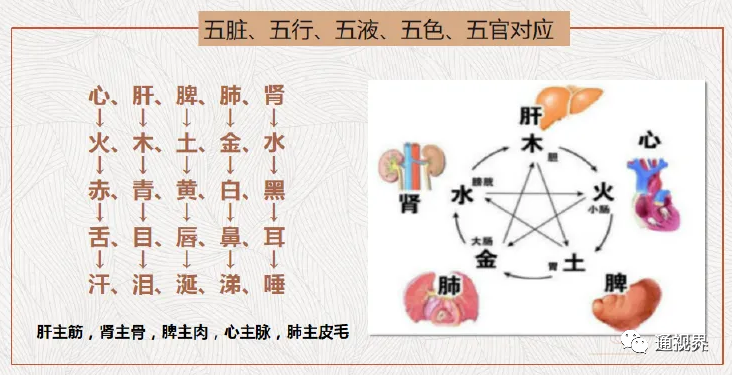
In the East, wind generates wood, wood generates sour, sour generates liver, liver generates tendons, tendons generate heart, and liver governs the eyes. In the heavens, it is mysterious; in humans, it is the Dao; on earth, it is transformation. Transformation generates the five flavors, the Dao generates wisdom, and the mysterious generates spirit. The spirit in the heavens is wind, on earth is wood, in the body is tendons, in the organs is liver, in color is green, in sound is the horn, in voice is calling, in movement is grasping, in orifices is the eyes, in flavor is sour, and in will is anger. Anger harms the liver, and sorrow overcomes anger; wind harms tendons, and dryness overcomes wind; sour harms tendons, and pungent overcomes sour.
In the South, heat generates fire, fire generates bitter, bitter generates heart, heart generates blood, blood generates spleen, and heart governs the tongue. In the heavens, it is heat; on earth, it is fire; in the body, it is pulse; in the organs, it is heart; in color, it is red; in sound, it is the zheng; in voice, it is laughter; in movement, it is worry; in orifices, it is the tongue; in flavor, it is bitter; and in will, it is joy. Joy harms the heart, fear overcomes joy; heat harms qi, cold overcomes heat; bitter harms qi, salty overcomes bitter.
In the Center, dampness generates earth, earth generates sweet, sweet generates spleen, spleen generates flesh, flesh generates lungs, and spleen governs the mouth. In the heavens, it is damp; on earth, it is earth; in the body, it is flesh; in the organs, it is spleen; in color, it is yellow; in sound, it is the palace; in voice, it is singing; in movement, it is belching; in orifices, it is the mouth; in flavor, it is sweet; and in will, it is thought. Thought harms the spleen, anger overcomes thought; dampness harms flesh, wind overcomes dampness; sweet harms flesh, sour overcomes sweet.
In the West, dryness generates metal, metal generates pungent, pungent generates lungs, lungs generate skin and hair, skin and hair are governed by the kidneys, and lungs govern the nose. In the heavens, it is dry; on earth, it is metal; in the body, it is skin and hair; in the organs, it is lungs; in color, it is white; in sound, it is shang; in voice, it is crying; in movement, it is coughing; in orifices, it is the nose; in flavor, it is pungent; and in will, it is worry. Worry harms the lungs, joy overcomes worry; heat harms skin and hair, cold overcomes heat; pungent harms skin and hair, bitter overcomes pungent.
In the North, cold generates water, water generates salty, salty generates kidneys, kidneys generate bone marrow, marrow generates liver, and kidneys govern the ears. In the heavens, it is cold; on earth, it is water; in the body, it is bone; in the organs, it is kidneys; in color, it is black; in sound, it is feather; in voice, it is moaning; in movement, it is trembling; in orifices, it is the ears; in flavor, it is salty; and in will, it is fear. Fear harms the kidneys, thought overcomes fear; cold harms blood, dryness overcomes cold; salty harms blood, sweet overcomes salty.
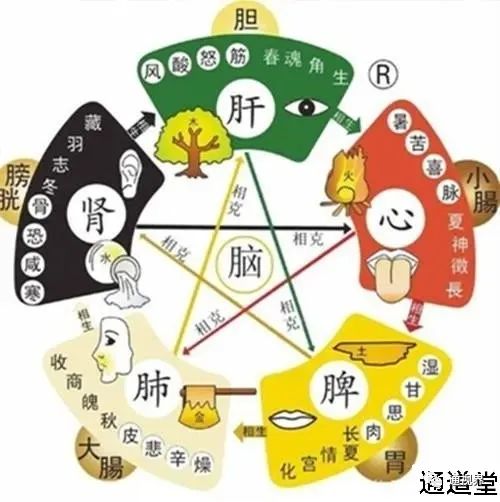
The relationship between the five organs and six bowels
1、Spleen and Stomach
The spleen and stomach are mutually related, governing the digestion, absorption, and transportation of nutrients and fluids to meet the needs of various tissues and organs in the body, hence the saying “the spleen and stomach are the foundation of postnatal life.” The stomach governs reception, while the spleen governs transformation, together completing the tasks of digestion, absorption, and transportation of nutrients.
The spleen also regulates dampness, governs blood, and controls the muscles of the limbs.
The stomach primarily digests food.
2、Kidneys and Bladder
The kidneys and bladder form a mutual relationship. The primary function of the kidneys is to store essence, which refers to the essence inherited from parents, known as congenital essence, the foundation of human reproduction and development; the other refers to the essence derived from the spleen and stomach, known as acquired essence, which is the material basis for maintaining life activities. The kidneys store the fire of the life gate; insufficient fire can lead to a general deficiency of yang qi, resulting in various diseases. The kidneys govern water, bones, and marrow, closely related to reproduction, growth, aging, and fluid metabolism.
The primary function of the bladder is to store and excrete urine. The bladder’s ability to excrete urine is closely related to the strength of kidney qi. When kidney qi is sufficient, urine can be timely secreted into the bladder and expelled from the body; if kidney qi is deficient and cannot consolidate, it may lead to frequent urination, incontinence, or urinary retention.
3、Heart and Small Intestine
The heart and small intestine are mutually related, with the heart being internal and the small intestine being external. The yang qi of the heart descends to the small intestine, helping it distinguish the essence from the dregs in food. If heart fire is excessive, it can transfer heat to the small intestine, causing symptoms such as short, red, painful urination, or blood in urine; conversely, if the small intestine has heat, it can also lead to excessive heart fire, resulting in symptoms like irritability, facial redness, and sores on the tongue.
The heart is the most important organ among the viscera, playing a leading and governing role. Traditional Chinese Medicine believes that the heart governs the spirit and is related to cognitive activities. For example, when we say “think with your heart,” we refer to the heart’s role in cognitive activities. The heart is the driving force of blood circulation, and the blood is delivered throughout the body through the heart’s pulsation. The abundance or deficiency of heart blood can be reflected in the pulse; the heart governs sweat and opens to the tongue, with changes in tongue quality reflecting the physiological and pathological changes of the heart.
The small intestine is located in the abdominal cavity, where food and fluids that have been digested by the stomach enter for further digestion, absorption of nutrients, and elimination of dregs. Problems with the small intestine can lead to digestive and absorption dysfunction, as well as abnormal bowel movements, such as abdominal pain, diarrhea, or reduced urination.
4、San Jiao (Triple Burner)
The physiological function of the San Jiao primarily involves the qi transformation and the pathway of food and fluids. These physiological functions are actually a combination of the lung’s function of dispersing defensive qi and distributing fluids, the spleen and stomach’s function of transformation, and the kidneys and bladder’s regulation of fluids and urine excretion, rather than the function of a single organ.
5、Lungs and Large Intestine
The lungs and large intestine form a mutual relationship. The conduction of the large intestine relies on the descending of lung qi; when lung qi descends, bowel movements occur normally, and feces are expelled smoothly. If the large intestine is obstructed, it can also affect the descending of lung qi.
The lungs connect to the trachea and throat, opening to the nose. The lungs are the respiratory organs, primarily governing the qi of the entire body. When lung function is normal, the airways are unobstructed, and breathing is even and regulated. If lung qi is insufficient, symptoms of weakened breathing, fatigue, shortness of breath, and spontaneous sweating may occur. The lungs govern the descending and regulating of fluids, directing them down to the bladder to maintain smooth urination.
6、Liver and Gallbladder
The liver and gallbladder are mutually related. The normal function of the liver’s dispersing ability ensures the proper storage and excretion of bile, allowing the gallbladder to function smoothly. When the liver and gallbladder are affected, they influence each other, so treatment should address both.
The liver regulates certain emotional activities, stores blood, and regulates blood volume, assisting the spleen and stomach in digesting food. The liver opens to the eyes, and liver diseases often lead to various eye problems.
The gallbladder is attached to the liver, and the bile stored in the gallbladder is secreted by the liver, “borrowing the excess qi of the liver to overflow into the gallbladder, accumulating and forming bile.” Their functions are interconnected yet distinct. In health maintenance or disease treatment, it is essential to consider the mutual relationship between the five organs and six bowels. By coordinating their relationships, diseases can be resolved.
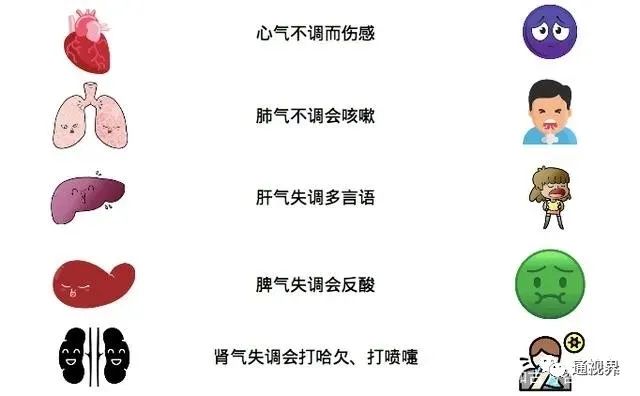
The relationships between the five organs
1、Heart and Lungs
The heart governs blood, while the lungs govern qi. The maintenance of the functional activities of the body’s organs and tissues relies on the circulation of qi and blood to deliver nutrients. Although the normal operation of blood is governed by the heart, it must rely on the propulsion of lung qi, and the ancestral qi stored in the lungs must be infused into the heart’s vessels to circulate throughout the body.
2、Heart and Liver
The heart is the driving force of blood circulation, while the liver is an important organ for storing blood. Therefore, when heart blood is abundant, liver blood is also plentiful, nourishing the tendons and promoting the normal activities of the limbs and body. If heart blood is deficient, leading to insufficient liver blood, it can result in symptoms such as pain in the tendons and bones, muscle spasms, and convulsions. Conversely, if liver qi stagnates and transforms into fire, it can disturb the heart, leading to symptoms of irritability and insomnia.
3、Heart and Spleen
The essence transformed by the spleen needs the circulation of blood to be distributed throughout the body. Conversely, heart blood must rely on the essence generated from the spleen’s absorption and transportation of food and fluids. Additionally, the heart governs blood, while the spleen regulates blood; normal spleen function is necessary for blood regulation. If spleen qi is weak, it can lead to blood not circulating properly.
4、Heart and Kidneys
The heart and kidneys interact and constrain each other to maintain a relative balance of physiological functions. Under physiological conditions, heart yang continuously descends, while kidney yin continuously ascends, intersecting and harmonizing, known as “heart-kidney intersection.” In pathological conditions, if kidney yin is insufficient and cannot ascend to nourish the heart, it can lead to excessive heart yang, resulting in an imbalance known as “heart-kidney disconnection.”
5、Liver and Spleen
The liver stores blood, while the spleen governs the transformation of food essence into blood. If spleen deficiency affects blood production, it can lead to liver blood deficiency, resulting in symptoms such as dizziness, blurred vision, and unclear sight. The liver prefers smooth flow and dislikes stagnation; if liver qi is stagnant and counteracts the spleen, it can lead to symptoms such as abdominal pain and diarrhea.
6、Liver and Lungs
The liver’s meridians penetrate and connect to the lungs, establishing a certain relationship. The rising of liver qi and the descending of lung qi are related to the body’s qi dynamics. If liver qi ascends excessively, it can hinder the lung’s descending function, leading to symptoms such as chest tightness and shortness of breath. If liver fire invades the lungs, it can lead to symptoms such as chest and rib pain, coughing, or blood in sputum.
7、Liver and Kidneys
The kidneys store essence, while the liver stores blood. Liver blood relies on kidney essence for nourishment, and kidney essence requires continuous supplementation from liver blood; they are interdependent and mutually supportive. Insufficient kidney essence can lead to liver blood deficiency. Conversely, liver blood deficiency can also affect kidney essence production. If kidney yin is insufficient, the liver may lose nourishment, leading to liver yin deficiency, resulting in symptoms such as dizziness, tinnitus, tremors, numbness, and convulsions.
8、Lungs and Spleen
The spleen transports the essence of food and fluids to the lungs, combining with the essence inhaled by the lungs to form ancestral qi (also known as lung qi). The strength of lung qi is related to the spleen’s ability to transform essence; thus, when spleen qi is strong, lung qi is abundant. When spleen deficiency affects the lungs, symptoms such as reduced appetite, reluctance to speak, and cough may occur. Clinically, the method of “tonifying the spleen and benefiting the lungs” is often used for treatment. For example, in cases of chronic cough with copious, thin, white phlegm, easy to expectorate, fatigue, and reduced appetite, although the disease manifests in the lungs, the root cause lies in the spleen, requiring the method of “tonifying the spleen, drying dampness, and transforming phlegm” for effectiveness. The saying “the lungs are the container of phlegm, while the spleen is the source of phlegm” reflects the relationship between the spleen and lungs.
9、Spleen and Kidneys
Spleen yang relies on kidney yang for warmth to function properly. If kidney yang is insufficient, spleen yang may weaken, leading to abnormal transformation and resulting in symptoms such as morning diarrhea and undigested food. Conversely, if spleen yang is weak, it can also lead to kidney yang deficiency, resulting in edema.
10、Lungs and Kidneys
The lungs govern the descending and regulating of fluids, directing them to the kidneys. The kidneys govern fluids, and through the transformation of kidney yang, the purest essence rises to the lungs, relying on spleen yang’s transformation to complete the function of fluid metabolism. If any of the lungs, spleen, or kidneys are dysfunctional, it can lead to fluid retention and edema. The lungs govern respiration, while the kidneys govern qi intake; both organs work together to maintain the body’s qi dynamics.
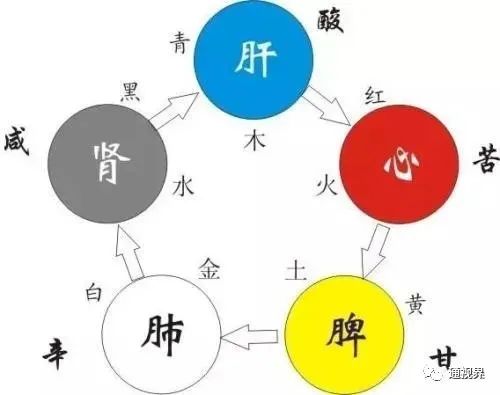
The five organs and the four seasons
1、Late Summer Nourishes the Spleen (Yellow Foods Nourish the Spleen)
The spleen belongs to earth; thought harms the spleen; the spleen opens to the mouth and lips, and its manifestation is in the muscles. The stomach corresponds to the spleen; the stomach receives, while the spleen absorbs and supplies fluids to the body. When the spleen’s function is well-nourished, it nourishes the kidneys; the time of the snake (9 to 11 o’clock) corresponds to the spleen meridian.
2、Winter Nourishes the Kidneys (Black Foods Nourish the Kidneys)
The kidneys belong to water; fear harms the kidneys; the kidneys open to the ears, and their manifestation is in the hair and bones. Tinnitus, ear blockage, and ear inflammation are related to kidney deficiency; the kidneys govern bones and are the filter for blood circulation. The bladder corresponds to the kidneys; friends with kidney deficiency may experience frequent urination. When kidney function is well-nourished, it nourishes the liver; the time of the snake (5 to 7 o’clock) corresponds to the kidney meridian, which is related to our reproduction, growth, and development.
3、Spring Nourishes the Liver (Green Foods Nourish the Liver)
The liver belongs to wood; anger harms the liver; the liver opens to the eyes, and its manifestation is in the nails and tendons. Dryness, soreness, and foggy vision are related to the liver; the gallbladder corresponds to the liver, and the liver and gallbladder reflect each other. The liver governs immunity and detoxification; when liver function is well-nourished, it nourishes the heart; the time of the pig (1 to 3 o’clock) corresponds to the liver meridian. The liver governs smooth flow, and not sleeping during the pig hour can greatly harm the liver.
4、Autumn Nourishes the Lungs (White Foods Nourish the Lungs)
The lungs belong to metal; sadness harms the lungs; the lungs open to the nose, and their manifestation is in the skin and hair. The lungs are the prime minister, responsible for absorption, exhaling waste, and inhaling oxygen; the large intestine corresponds to the lungs. The time of the tiger (3 to 5 o’clock) corresponds to the lung meridian, which is the most dangerous time for older individuals, as pulse, breathing, and blood pressure are most likely to experience dangerous situations, threatening life. “The lungs govern the skin and hair” indicates a significant relationship between the lung meridian and our skin.
5、Summer Nourishes the Heart (Red Foods Nourish the Heart)
The heart belongs to fire; joy harms the heart; the heart opens to the tongue, and its manifestation is in the face. Numbness, blisters, and ulcers of the tongue are related to the heart; the small intestine corresponds to the heart, and the heart is connected to the small intestine. The heart is the driving pump, pushing blood circulation. When heart function is well-nourished, it nourishes the spleen; the time of noon (11 to 1 o’clock) corresponds to the heart meridian.

The five organs have five fears
The liver fears stagnation, the heart fears exhaustion, the spleen fears cold, the lungs fear smoke, and the kidneys fear dryness. When the five organs are harmonious, the body can be healthy; therefore, we should try to avoid some bad habits.1、The Heart Fears Exhaustion
“Physical exhaustion is not scary; the scariest thing is mental exhaustion!” Many people resonate with this statement. Traditional Chinese Medicine believes that the heart plays a dominant role among the five organs. If the heart is too exhausted, it will not only affect the coordination between other organs but also directly impact physical health.
Factors causing heart exhaustion include various pressures (such as work, life, etc.), negative emotions, and overthinking.
Ways to relieve heart exhaustion include occasionally daydreaming, doing aerobic exercise, venting suppressed emotions, and eating foods that clear heart fire in summer.
2、The Liver Fears Stagnation
Traditional Chinese Medicine believes that the liver governs blood storage and dispersal, playing an important role in maintaining the smooth flow of qi throughout the body. Therefore, the liver fears “stagnation” the most.
Behaviors that easily cause liver stagnation include excessive alcohol consumption, negative emotions, and excessive eye strain.
3、The Spleen Fears Cold
The spleen governs transformation, which includes transportation, digestion, and absorption. Traditional Chinese Medicine believes that all organs and tissues rely on the spleen for nourishment! The health of the spleen and stomach directly affects the body’s absorption of nutrients.
The spleen and stomach fear “cold” the most; frequently consuming excessively cold foods can damage the normal function of the spleen and stomach. Additionally, excessive worry and irregular eating habits can also harm the spleen and stomach.
4、The Lungs Fear Smoke
The lungs fear smoke, which includes both the smoke we inhale and smoke from cooking, dust, etc. Traditional Chinese Medicine believes that the lungs govern qi (the qi of respiration and the qi of the entire body). When lung qi is balanced, the qi dynamics are smooth, allowing the five organs to function normally.
The strength of lung qi significantly impacts lifespan, and frequent smoking not only damages lung qi but also impairs normal lung function.
5、The Kidneys Fear Lack of Water
Traditional Chinese Medicine believes that the kidneys are the foundation of congenital essence, governing the storage of essence, fluids, and qi intake. The kidneys fear lack of water the most.
People who drink too little water are often more prone to kidney stones and other diseases than those who drink enough. Adequate water intake helps dilute salts and blood in the body and promotes metabolism. If dehydrated, excess salts and other substances can accumulate in the body, damaging the kidneys and other organs.
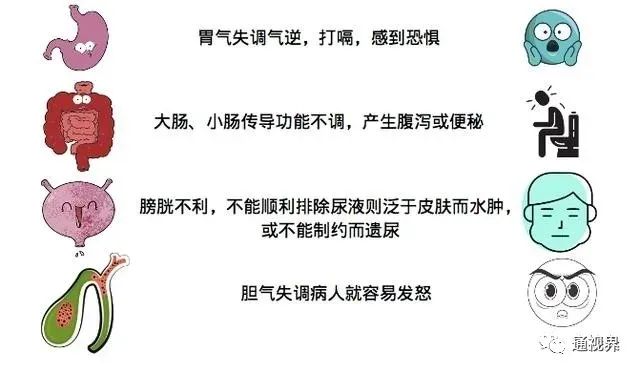
The Five Organs and the Five Flavors
The five flavors refer to sour, bitter, sweet, pungent, and salty. Each of the five organs has its corresponding flavor, and each flavor corresponds to a specific organ. Proper consumption of the five flavors can nourish the five organs, but excessive preference for a particular flavor can disrupt the mutual coordination of the five organs, leading to disease. A sudden change in flavor preference may indicate a health warning from the body.
1、Preference for Sour Flavor, Pay Attention to the Liver
The liver’s primary flavor is sour; moderate consumption of sour foods can nourish the liver. However, excessive sourness can lead to liver stagnation and qi obstruction. A sudden craving for sour foods may reflect an issue with the liver. Excessive sourness can also hinder the normal physiological function of the stomach, affecting digestion and leading to a series of spleen and stomach problems.
2、Preference for Bitter Flavor, Pay Attention to the Heart
Bitter flavor enters the heart; moderate consumption of bitter foods can clear heat and fire. However, excessive preference for bitter flavor often indicates excessive heart fire, with common symptoms including palpitations, insomnia, mouth sores, and a red tongue tip. Although bitter foods have certain nutritional value, most are cold in nature. Long-term preference for bitter flavor can damage heart qi and exacerbate symptoms of poor appetite, abdominal cold pain, and diarrhea due to spleen and stomach deficiency.
3、Preference for Sweet Flavor, Pay Attention to the Spleen and Stomach
Moderate consumption of sweet flavor can nourish the spleen and stomach, which is why many spleen tonifying herbs are sweet. However, excessive preference for sweet flavor can lead to dampness, obstructing the middle burner and harming the spleen. A preference for sweet flavor may also obstruct the spleen and stomach or further damage them, leading to symptoms such as poor appetite and indigestion. A sweet preference can also lead to dental caries, diabetes, and obesity. To nourish the spleen and stomach, one should consume more grains and drink tea to strengthen their function.
4、Preference for Pungent Flavor, Pay Attention to the Lungs
Pungent flavor mainly comes from ginger and garlic; moderate consumption helps to release the exterior, move qi, regulate blood, and promote sweating, which can first relieve lung qi and then disperse dampness from the spleen and stomach. In regions with high humidity, such as Sichuan, people tend to prefer spicy foods. However, long-term preference for pungent flavor can lead to excessive lung qi dispersal, qi depletion, and mental fatigue, with common symptoms including back pain, numbness, fatigue, and dizziness. Additionally, a strong preference for spicy foods can easily lead to gastrointestinal and anal diseases.
5、Preference for Salty Flavor, Pay Attention to the Kidneys
Salty flavor has functions of softening hardness, dispersing masses, and nourishing yin blood. Moderate salty flavor can nourish the kidneys, but excessive preference for salty flavor can damage the kidneys, leading to kidney qi deficiency or dysfunction. If kidney yang is damaged, it can easily lead to excessive heat and may cause hypertension, heart disease, and other conditions. Generally, healthy adults should limit salt intake to no more than 6 grams per day, while some chronic disease patients may only need about 3 grams.
